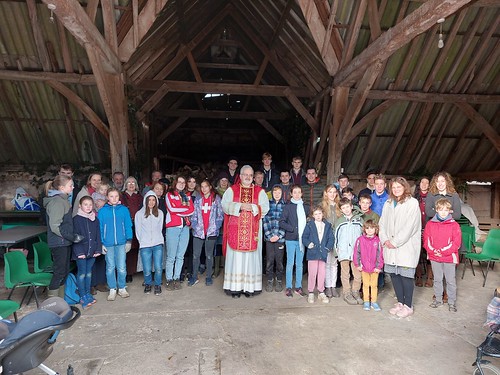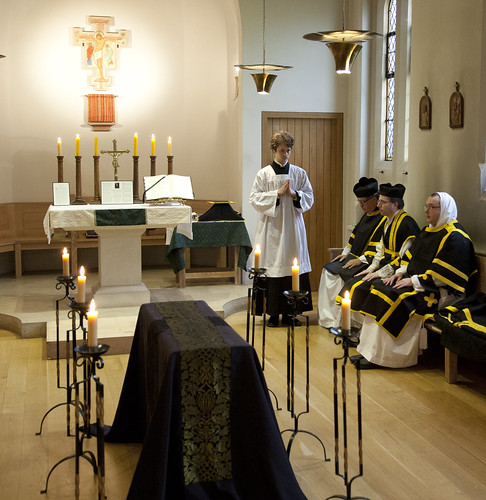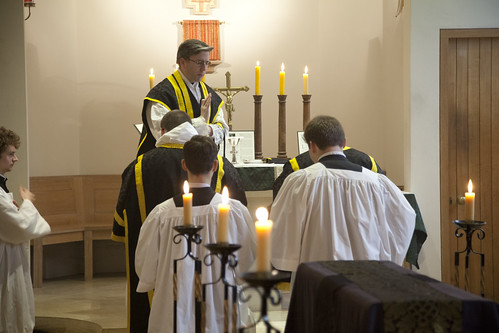 |
| The absolution before Communion: High Mass of Requiem at St Benet's Hall (Fr Edward van den Burgh) |
Labels
- Bishops
- Chant
- Children
- Clerical abuse
- Conservative critics of the EF
- Correctio Filialis
- FIUV Position Papers
- Fashion
- Freemasonry
- Historical and Liturgical Issues
- Islam
- Liberal critics of the EF
- Marriage & Divorce
- Masculinity
- New Age
- Patriarchy
- Pilgrimages
- Pope Francis
- Pro-Life
- Reform of the Reform
- Young people
Wednesday, December 29, 2021
Letter of the week: from The Tablet
Monday, December 27, 2021
Responsa ad dubia: good news on private Masses
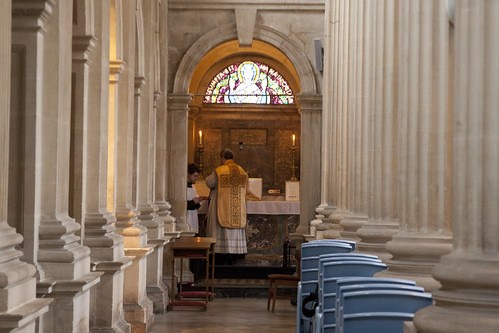 |
| A private Mass in a side-chapel, at Prior Park, England, at our Priest Training Conference in 2016 |
Friday, December 24, 2021
Thursday, December 23, 2021
Canonists cast doubt on the force of the Responsa ad dubia
 |
| LMS Pilgrimage to Chideock; High Mass was celebrated in the presence of Bishop Mark O'Tool of Plymouth, England. Photo by John Aron. |
My latest in the Catholic Herald. I'm grateful to them for publishing this so swiftly.
It is worth emphasising that the problem I discuss, essentially that the requirements on bishops in the Responsa infringe bishops' rights under Canon law, is not just some fever-dream of Traditional Catholics: it is being said by canonists all over the place. I am fortunate in having access to canonical advice from qualified people, which helped us in preparing our Canonical Notes on the Responsa, but you can see this online now, notably here, here, and here. Confronted with this difficulty by the journalist Edward Pentin, the Prefect of the Congregation for Divine Worship, Archbishop Roche, did not say anything which is likely to change anyone's mind. At this point we have to take the matter seriously.
My Catholic Herald article begins:
On Saturday 18th December a document was published by the Congregation for Divine Worship tightening up restrictions on the Traditional Latin Mass: Responsa ad dubia. This is a clarification of Pope Francis’ Motu Proprio Traditionis Custodes, answering questions (‘dubia’) sent to the Congregation by bishops.
Since then canonists all over the Catholic world have been examining the document, which appears to tighten the screws on the availability of the Traditional Mass considerably compared with Traditionis Custodes itself. By a stroke of the pen it prohibits marriages, baptisms, burials, and even blessings, using the older books, outside a tiny number of ‘personal parishes’. Similarly, it prevents priests from saying more than one Old Rite Mass on a Sunday, and allows them to say it on a weekday only if they have no Novus Ordo Masses to celebrate.
The ban on parishes noting the times of Traditional Masses on their bulletins has caused widespread ridicule. However, it suggests a level of attention to detail, and a desire to make the Traditionist phenomenon disappear from view, which is more than a little alarming. There is no reference to this, or to the other points just mentioned, in Traditionis Custodes, which now appears quite mild by comparison.
Responsa ad dubia: back to the future, forward to the past
 |
| The Holy Mile at Walsingham in 2018, in the rain. |
In the wake
of the Responsa ad dubia from the Congregation for Divine Worship, there
has been a fair amount of chatter on the internet about the uniquely bad situation
Catholics attached to the Traditional Mass and Sacraments now find themselves in.
As the canonists have got to work in interpreting the document, it turns out to
have less force than previously assumed by many—and the Latin Mass Society has
produced some notes to explain the situation in detail, which you can see here. Nevertheless, bishops have
the power to follow its lead.
This may mean, for example, that in a particular diocese the number of celebrations of the Traditional Mass is drastically reduced, or stopped: indeed, in some dioceses this has already happened. Further, in places where it had been straightforward to get married using the older books, to have one’s baby baptized using them, or have one’s deceased loved ones buried using them, this may become a headache, or simply impossible. Again, finding out if Masses are happening may become difficult, if they are no longer simply advertised on online parish bulletins.
This situation, insofar as it becomes a reality, will certainly be unjust and pastorally harmful. Contrary to certain febrile suggestions on Twitter and elsewhere, however, it does not mean the end of the Latin Mass Society, or the Una Voce Federation, or similar bodies around the world. Because if this situation were to arise, it might be new to some of the younger Traditional Catholics on social media, but it would not be new to the Traditional movement as a whole. It would simply take back to before 2007, or perhaps before 1988.
Difficult or
impossible to get a priest to celebrate a wedding or baptism according to the
old books?![]()
Closest Traditional Mass an hour or more's drive away? ![]()
Masses not
being publicly advertised, by order of the bishop? ![]()
Masses needing to be kept away from the ordinary, legitimate, worshippers?![]()
Arbitrary restrictions and conditions placed on Masses?![]()
Official
hostility expressed at every level of the Church? ![]()
Accusations
of disloyalty and schismatic leanings? ![]()
How did we survive the lean years before 2007? Well, it was tough. Many, many supporters of the Latin Mass Society were only able to get to the old Mass for occasional celebrations: an annual Mass here, a pilgrimage there, a Day of Recollection somewhere else, often a long journey from where they lived. Some, particularly those with difficulty travelling, could get to no Masses at all. Coach trips from London were frequently part of LMS events, for people who didn’t have cars and were starved of opportunities to get to, especially, sung Masses. I remember driving an hour and a half each way to attend a High Mass (with deacon and subdeacon), with a good choir, in Portsmouth Cathedral, in about 2003, because these kinds of Masses hardly ever happened. It was only with considerable difficulty that the Latin Mass Society established, in the early 2000s, an annual celebration of the Sacrament of Confirmation in London, and people came from all over England, Scotland, and even France and Belgium.
The Fraternity of St Peter, founded in 1988 with the good will of Pope John Paul II, found it extraordinarily hard-going in the early years, indeed up to 2007, as did the other traditional priestly institutes attached to the Traditional Mass. I well remember the heroic, and ultimately successful, efforts of priests of the FSSP and also of the Institute of Christ the King Sovereign Priest, to become established in England. Bishops were extremely reluctant to give them stable apostolates, with a place to live and a church to say Mass in.
And indeed things have continued to be difficult since 2007. Perhaps many Traditional Catholics in the pews do not realise quite how difficult things are for those, both priests and lay Una Voce activists, who try to organise Masses and other events, stabilise apostolates, and talk to bishops and the Curia. When Una Voce International did its world-wide survey of the Traditional Mass in 2020, we received many reports of whole countries where the bishops simply refused to talk to the local Una Voce group, and persecuted priests who wanted to celebrate the ancient Mass, and where, as a result, years of requests had yielded no celebrations at all.
It has never been easy. And now it is getting harder. We have been told that our annual Masses in Westminster Cathedral are now to be Sung, without deacon or subdeacon, as part of the implementation of Traditionis Custodes. I have no idea whether the “other sacraments” are going to be allowed, and in which dioceses, of England and Wales, let alone elsewhere. Perhaps Traditional Masses will have to take place in such a way that no-one not in the 'group' for which they are celebrated will ever stumble across them. I remember in the bad old days one priest's arbitrary rule was that there should be a two-hour gap between a Traditional Mass and a Novus Ordo one, so toxic and infectious were we deemed to be.
How are we going to cope? The Traditional movement and Una Voce groups in particular were built precisely to cope with this. We established close-knit groups for moral support and networks for exchanging information: and these still exist. The technology has developed (find our Telegram channel for Mass listings here), but the principle remains the same. In fact, in our organisations, in our ability to communicate, and in many other ways, we are stronger than ever.
The Latin Mass Society is the place, in England and Wales, where Catholics attached to the Traditional Mass can find information, support, and like-minded people. Our network of Local Representatives understand the conditions of each diocese and parish. We are in touch with priests and bishops, and through Una Voce International, with the Roman Curia.
All Latin Mass Society / Una Voce groups rely on supporters for funds and volunteers, and this is the moment, if you have not yet done so, if you are concerned about the Traditional Mass, to show your support by joining them: you can also become a 'Friend' of Una Voce International.
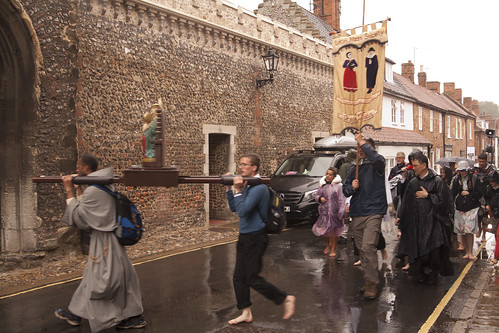 |
| Qui autem perseveraverit usque in finem, hic salvus erit. (Matt 24:13) |
Wednesday, December 22, 2021
LMS Canonical Notes on the Responsa ad dubia
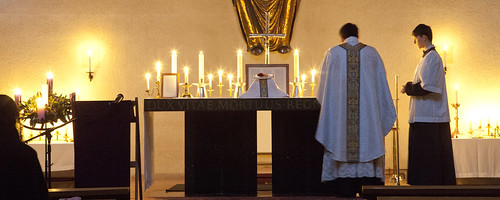 |
| Rorate Mass last Saturday, Holy Rood, Oxford |
Cross-posted from Rorate Caeli.
You can read the Latin Mass Society's discussion of the Congregation for Divine Worship's Responsa ad dubia, point by point, here.
Many canonists on the internet and off it have noticed that the Responsa issued by the CDW seem to be making demands on bishops and priests which go beyond the authority of a Roman Congregation to make. In some cases they seem to be taking away prerogatives from bishops which they are explicitly given by Canon Law, and even the Second Vatican Council. The Supreme Legislator, the Holy Father, can of course change Canon Law, but it would be ludicrous to suggest that the Congregation for Divine Worship can do so. Since the Holy Father has—presumably, deliberately—given the Responsa only generic, not ‘specific’, approval, it is the Congregation’s authority which is at issue.
Tuesday, December 21, 2021
Keep calm and find out where go to Traditional Mass
 |
| Rorate Mass at Holy Rood, Abingdon Road, Oxford, last Saturday (with a very slow shutter speed!) |
Monday, December 20, 2021
A small difficulty with the Responsa ad dubia
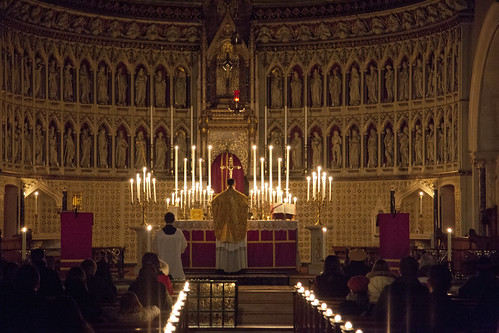 |
| Rorate Mass at the Oxford Oratory, England |
All the Church’s legislation needs to be understood in light of common sense, of previous legislation with greater authority, and of the Church’s the fundamental theological and moral principles. These principles of are of particular importance when we consider legislation which appears, on the one hand, to be hastily composed, and on the other, to have far-reaching, and perhaps unforeseen, consequences.
Tuesday, December 14, 2021
Tuesday, December 07, 2021
'Ministers of Christ' by Peter Kwasniewski
Friday, December 03, 2021
Pilgrimage to Lyford Grange
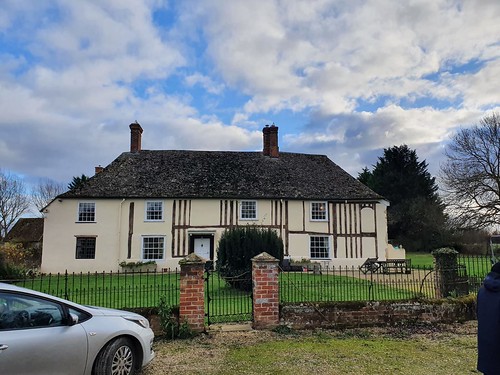
Thursday, December 02, 2021
Annual Requiem in St Benet's Hall

Wednesday, December 01, 2021
An anti-Christian cultural hegemony
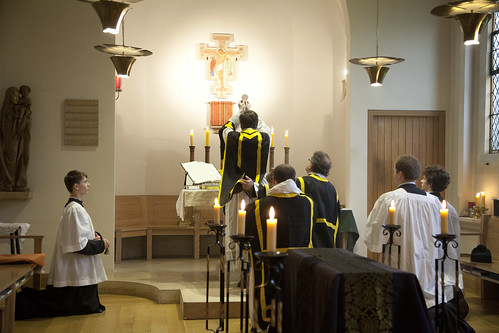 |
| Mass last Saturday: annual Requiem in St Benet's Hall, Oxford. |
Mantel, like the author Philip Pullman, seems to have “issues”, as the modern jargon has it, with Catholic faith and culture. She has no intrinsic significance — there have always been strange people around — what is important is the use which has been made of her: she has been awarded all kinds of prizes and her repulsive novels have been adapted for the Royal Shakespeare Company. Pullman, another winner of multiple awards, has had one book made into a film and another into a play. Both writers have received the accolade of special editions of their works done for the bibliophiles of the Folio Society.
The publicity machines have nevertheless found it difficult to explain these peculiar individuals. Mantel was initially praised for the historical accuracy and realism of her work but, as real historians began to notice her material, she hastily rebranded it as a very fictional kind of historical fiction. After pocketing prizes for children’s books, Pullman decided, as his graphic descriptions of child torture began to get a bit out of hand, that this was just a misunderstanding; no, he was writing for adults.
Such U-turns would have sunk lesser folk, but the secularist establishment needs Mantel and Pullman. They possess some literary skill and their work can be used to counter-balance and even to exclude the Christian narratives given to us by writers of a previous generation: notably, Robert Bolt’s play and film, A Man for All Seasons, about St Thomas More, and the children’s books of C.S. Lewis. Literature and historical memory is being remade in the snarling image of secular modernity.




